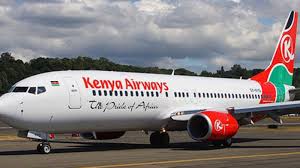Tanzania bans Kenya Airways flights

Michael Wakabi
Kenya and Tanzania’s on-and-off trade disputes have take a turn for the worse once again, with Tanzania withdrawing Kenya Airways rights to operate passenger flights between Nairobi and Dar es Salaam. The move, which comes into force on January 22, is in apparent retaliation for Nairobi’s refusal to grant Air Tanzania 5th Freedom Rights for its cargo flights between Nairobi and third countries.
“Tanzania Civil Aviation Authority, on behalf of the aeronautical authorities of the United Republic of Tanzania, has decided to rescind the approvals for Kenya Airways (KQ) to operate passenger flights between Nairobi and Dar es Salaam under Third and Fourth Freedom Traffic Rights with effect from 22, January 2024,”Tanzania Civil Aviation Authority TCAA Director General Hamza S. Johari, says in an undated “Public Notice.”
Johari goes on to explain that the decision is to “reciprocate the decision by the aeronautical authorities of the republic of Kenya to refuse the Tanzanian request for all-cargo flight operations by Air Tanzania Company between Nairobi and Third countries, contrary to Section 4 of the Memorandum of Understanding on Air Services, between Tanzania and Kenya signed on 24 November 2016 in Nairobi, Kenya.”
The notice then goes to affirm that following the decision, there shall be no passenger flights by KQ between Nairobi and Dar es Salaam from 22 January 2024.
“The United Republic of Tanzania shall always strive to adhere to the principles of Chicago Convention 1944 and Bilateral Air Services Agreements between states,” Johari writes before signing off.
The Third Freedom of the Air refers to the right of an airline to carry passengers or cargo from a carrier’s designated country, into a foreign country, or the outbound leg of a flight. The Fourth Freedom of the Air allows the return flights from the destination country. On the other hand, the Fifth Freedom of the Air allows an airline to carry passengers from a foreign country, to an intermediate or other destination other than the carriers home country. An example are the flights that Kenya operates out of Entebbe, carrying passengers to other countries within the region and Africa in general.
In all, there are nine freedoms of the air, governing the operations of aircraft into or over territories of other countries. The First Freedom grants rights for airlines to overfly the territories of other countries without landing while the Second Freedom allows an aircraft or airline to land in another country for non-commercial purposes.
256BN was not immediately able to establish how many flights will be affected and the impact of the decision for passengers on the busiest air route in East Africa.
The escalation, one of several that have seen disruption of air services between the two East African Community member states in recent years, highlights the pervasive protectionism, that is strangling African air transport. Kenya Airways operates what was ranked the largest cargo hub in Africa in 2021 and is very protective of that status.
While Tanzania has adopted a radical response, 256BN has learned that there has been a a low-level dispute between Uganda and Kenya over cabotage rights for Uganda Airlines between Nairobi and Mombasa. While Kenya did not refuse outright, it pegged the right on being assigned 5th Freedom rights between Entebbe and London for Kenya Airways. Cabotage refers to the right of a foreign registered airline to operate domestic passenger or cargo flights in another country.
Working with the Addis Ababa based African Civil Aviation Commission AfCAC, the International Air Transport Association IATA, has been trying to nudge Africa to liberalise air travel. The move is one of the key pillars to unlocking Africa’s full potential and to increase its share of global aviation. Some 34 African states have signed to the Single African Air Transport market SAATM, since it was launched six years ago in January 2018.
However, implementation has been slow and staggered. Speaking at IATA’s Focus Africa Conference in Addis last June, AfCAC Secretary General Ms Adefunke Adeyemi, said they had decided to adopted a phased approach to implementation has , starting with clusters of countries that are willing to liberalise air services between themselves. Seven countries, including Kenya and Rwanda, signed to such a pilot in December 2022.

 African Heads of state head to South Korea next week for Summit talks
African Heads of state head to South Korea next week for Summit talks
 Trading leads as main source of income for Ugandans
Trading leads as main source of income for Ugandans
 New leadership for bankers’ umbrella as total assets top $12 billion
New leadership for bankers’ umbrella as total assets top $12 billion
 Brussels Airlines to announce Nairobi service
Brussels Airlines to announce Nairobi service
 SITA promises enhanced travel experience after Materna acquisition
SITA promises enhanced travel experience after Materna acquisition
 Saudia’s 105 aircraft order stretches A320neo lead over rival Max
Saudia’s 105 aircraft order stretches A320neo lead over rival Max
